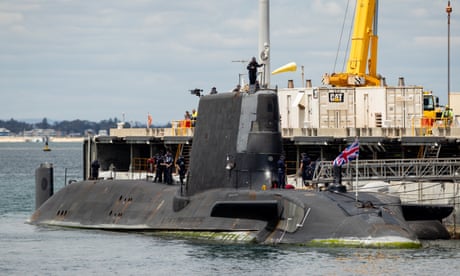- by foxnews
- 08 Apr 2025
Defence blocks access to advice on location choice for Australia’s nuclear submarines base
Defence blocks access to advice on location choice for Australia’s nuclear submarines base
- by theguardian
- 09 Apr 2022
- in news

Voters will be kept in the dark on how Scott Morrison's government selected three potential bases for Australia's planned nuclear-powered submarines, after the advice was blocked from release.
With the prime minister preparing to formally call the election within days, Labor demanded the government reveal how it shortlisted the locations to prove the announcement was "not just a marketing ploy".
Morrison named Brisbane, Newcastle and Wollongong's Port Kembla as three contenders for a new eastern submarine base, and revealed Aukus-related infrastructure works would cost up to $10bn, in a keynote national security speech last month.
The government is expected to lock in one of these sites late next year, once further studies and negotiations are completed.
Morrison said the "three preferred locations" were identified "following significant work by Defence reviewing 19 potential sites", although a minister later said it was the cabinet's national security committee that had "narrowed it down to three".
Guardian Australia applied to the Department of Defence under freedom of information laws seeking the site analysis. The request also covered any advice, briefings or submissions prepared for the defence minister, Peter Dutton, regarding the preferred locations.
The department confirmed this week that it had found one document that fitted this description, but decided to deny access to it on a number of grounds, including the cabinet exemption.
"The document in the scope of this request is exempt as it has been submitted to cabinet, or was brought into existence for the dominant purpose of submission for the consideration of cabinet," the FOI decision maker said in a letter this week.
"The document, if disclosed, would reveal a cabinet decision."
The decision contrasts with the previous release of a detailed 2011 Navy submarine basing study. The three potential sites Morrison announced last month - Port Kembla, Newcastle and Brisbane - were not among the top five options listed in that earlier study.
Labor's defence spokesperson, Brendan O'Connor, questioned whether the government was "hiding their advice because the prime minister has made a political decision in shortlisting three east coast submarine bases".
"To demonstrate this is not just a marketing ploy, the government must transparently answer questions about the way the sites have been chosen and who chose them," O'Connor said.
"Australians deserve to know if the government went through rigorous processes or if these bases have been chosen on a whim close to an election."
The South Australian independent senator Rex Patrick said the document should be released, even if it was politically sensitive.
Patrick said the latest advice was a matter of "great public interest", particularly to the residents of Port Kembla, Newcastle and Brisbane.
He said the government could not be taken on trust when it came to the process it used to select the three east coast sites.
"The timing of this announcement just before an election and the fact that it departs from the Navy's previous analysis is quite inexplicable," Patrick said.
The 2011 study said it "would be impractical" to develop a future submarine basing capability at Port Kembla, noting it had previously been found to be "a small and congested harbour with little space for substantial expansion".
A Defence spokesperson explained last month why some of the conclusions were no longer valid, saying changes in commercial activity at Port Kembla had released a large pocket of land "now potentially suitable for creation of a new naval base".
They also said Sydney Harbour - which was favoured in the 2011 study - was "not considered a viable long-term solution" for a permanent submarine base because of "limitations on berth space and shore facilities".
But the new advice is not being released.
In addition to citing the cabinet rule, the department said the document contained information relating to Australia's relationship with other governments. Releasing it could damage "international confidence and close relationships".
The FOI decision maker also said releasing the document could "diminish the commercial advantage" of those organisations or businesses "and could reveal potential market opportunities for competitors".
Defence did not respond to questions on Thursday or Friday, including on how the decision to keep the document confidential was consistent with the previous release of the 2011 study with redactions where appropriate.
The unanswered questions also included whether Defence explicitly recommend that the three sites named by Morrison were the ones that should be shortlisted.
Morrison, who has been seeking to make national security a core part of his election campaign message, announced the base shortlist in a speech warning of the emergence of a new "arc of autocracy", apparently referring to China and Russia.
He has promoted the Aukus security partnership with the UK and the US as a signature achievement, although the submarine construction plans are still subject to a joint study that is due to be completed by early 2023.
On Thursday Morrison sought to reassure South Australian voters that the government still intended to build as much of each submarine as possible in Adelaide.
- by foxnews
- descember 09, 2016
Ancient settlement reveals remains of 1,800-year-old dog, baffling experts: 'Preserved quite well'
Archaeologists have recently unearthed the remarkably well-preserved remains of a dog from ancient Rome, shedding light on the widespread practice of ritual sacrifice in antiquity.
read more


